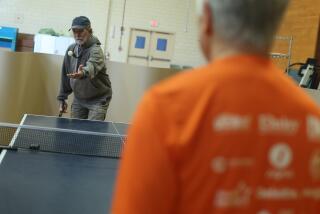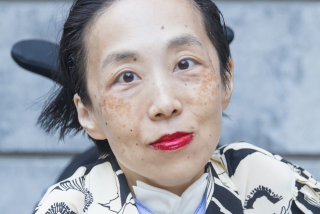Make Life Worth Living : Suicide: The Kevorkian trial may revive the specter that the disabled have no reason to live. But society’s lack of support is what causes their despair.
- Share via
The decision by Michigan prosecutors to file first-degree murder charges against Dr. Jack Kevorkian--the proud inventor of a machine that makes suicide push-button easy--revives a debate that we severely disabled people both welcome and dread. Mos of us welcome the filing of charges, yet dread that the trial will provide a platform for the hidden prejudices against disabled people--and end with a judicial imprimatur for killing us.
Kevorkian is not being tried for inventing the death machine, but for applying it. He hooked up a middle-aged woman, Janet Adkins, who had become convinced that she had Alzheimer’s disease. Though she had consulted only one doctor before asking Kevorkian to connect her to his invention, he agreed to do it after spending part of an evening over dinner with her.
The killing machine is a copy of a machine used in some state execution chambers, except that the victim pushes the button rather than a prison official.
My dread concerning Kevorkian’s trial is that both the prosecution and the defense will agree on assumptions about the lives of disabled people, as seen by people who have never had a severe disability. The undisabled too often assume that people would rather die than have a life-altering disability.
Disabled people like me know that there is nothing natural about the desire to die. We know, also, that two things drive us to death. One is fear of the unknown. What will happen to me now that I am disabled? The other is not being able to get the material and psychological support necessary to sustain our lives. Who will feed me now that I can’t feed myself? How can I bear being dependent on others for things I used to do for myself? These are nearly the same as the factors that drive the so-called able-bodied to attempt suicide.
A decade and a half ago I lost my job. Soon I lost my wife in divorce, my home, and, in a very real way, my children. I was well-qualified for other jobs but I was 45, used a wheelchair and had hypertension acquired during my tenure as a hospital administrator. It would have been rough enough at 45 to find a good job, but add the other factors and I was in trouble. Hundreds of resumes got me only a few interviews and no jobs. I felt (as it turned out, accurately), that my management career was finished. I had, without realizing it, entered a deep depression. If Kevorkian had been around, I might not be writing today. Instead I called my HMO about a physical problem and something I said got me an appointment with a psychiatric social worker the next morning. Fortunately, she did not assume that someone severely disabled should want to die, and my HMO didn’t have a killing machine.
For some reason, anyone in a bed or connected to assistive machines loses humanity and is a target for “right to die with dignity” philosophies. Why not a right to live with dignity? Dying with dignity hardly lasts long enough to enjoy, though it is cheaper. I worry a lot because I now use a power wheelchair and an assistive breathing machine at night. Does that mean that I should be urged to die, since I can’t live without life-sustaining machinery, a standard I often hear used to justify the deaths of fellow disabled people?
When the trial begins, and all of the able-bodied ethicists, doctors and lawyers begin discussing the right to die again on “Nightline” and “MacNeil/Lehrer,” able-bodied people should ask themselves whether they are sure they would want to die, and why, if they became severely disabled. I suggest that many would realize that the impulse comes from fear of being pauperized, of not getting necessary help, of being in the way, a burden, unloved, isolated and rejected--which have nothing to do with the disability itself and everything to do with the response of society to the disabled.
Surely, no one wants to be disabled. And it is not true that life is always worth living. There are cases of extreme, unrelievable pain, of total lack of consciousness near death, that may make understandable individual acts unendorsed by society. But even in extreme cases we should be careful to question alleged suffering.
Are those who support Kevorkian sympathetic to the plight of a 54-year-old woman who, though still able, feared that she might become disabled, or are they concerned about their own inconvenience and expense if, say, a parent got Alzheimer’s disease? As a society, have we decided that we can’t afford to care for the helpless? Have we decided that medical progress has gone too far in preserving life and now should be used to terminate life? But what is the meaning of progress, if it is not about saving lives and doing our damndest to make these lives worth living?
More to Read
Sign up for Essential California
The most important California stories and recommendations in your inbox every morning.
You may occasionally receive promotional content from the Los Angeles Times.













